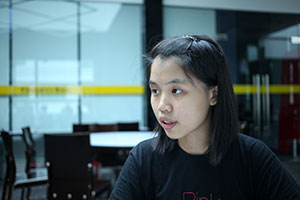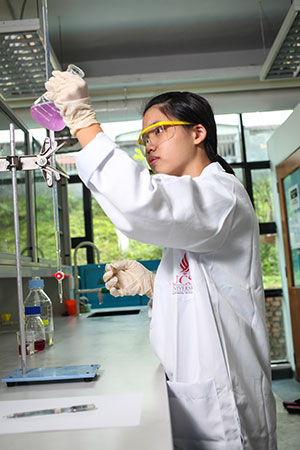Engineering change at Imperial
July 11, 2016 | Campus NewsDriving innovation at a world-class institution like Imperial College London is a distant dream for most people but at UCSI University, it passes as an annual affair for engineering students.

Just ask Lee May Yan, a third-year chemical engineering student who was recently selected to advance the progress of the Cenosphere Enhancement and Optimisation Project at Imperial.
Despite gaining inside information from the pioneering batch of UCSI seniors who went to Imperial last year – May Yan is leaving nothing to chance as she prepares for her upcoming stint in London.
For starters, it isn’t any British university. Imperial is consistently rated among Britain’s top three – and the world’s top 10 – universities. It is also affiliated with 14 Nobel Prize winners like Alexander Fleming, the discoverer of penicillin, and Dennis Gabor, the inventor of holography.
And if that intellectual exhilarating environment isn’t challenging enough, the 22-year-old Subang Jaya lass has never been overseas.
“I’ve never travelled before and this is practically the first time I’ll be getting out of my comfort zone,” muses May Yan who is also a UCSI scholarship recipient. “Going to a new country presents a new set of challenges and I’ll have to be more independent.
“I’d better be. Imperial’s heritage is steep in scientific discovery and it’ll be the first time I’ll conduct research at such an advanced level.”
Her mission in London: To optimise existing research on functional particles, specifically coal fly ash, in the bid to improve current methods of extracting cenosphere – a lightweight, inert, hollow sphere made largely of silica and alumina that varies in colour from grey to white.

The extraction process is as exacting as it is time-consuming.
First, the coal ash – the very same pulverised ash found under a barbecue grill – must be pre-treated, undergoing a process called sifting, until it reaches a suitable particle size.
It is then measured and heated at high temperatures to make the ash particles hollow – imagine bubbles with solid surfaces. With a lesser density than water, the particles become extremely light.
And why is something so small – and light – so important?
“Cenosphere is used to create lightweight cement and it’s also a good filler for polymers,” explains May Yan. “Its benefits are tremendous, particularly in the construction industry.
“Cement made with cenosphere is much lighter and construction workers can deal with lesser loads of cement. Less physical exertion reduces the body’s wear and tear and we are looking at long term health benefits for workers in the sector.”
At Imperial, May Yan will work under the supervision of Dr Jerry Heng, a senior lecturer at Imperial who co-leads the university’s Surfaces and Particle Engineering Laboratory (SPEL).
She will also have the invaluable opportunity of working alongside other world-class researchers who advance knowledge in particle, materials and surface science.
“Dr Heng’s principal area of research has advanced scientific understanding on the impact of particle engineering unit operations on surface properties,” says May Yan. “He has also advanced modelling tools that positively impact the prediction and control of scientific operations and furthered the development of gas chromatographic characterisation methodology.
“He’s also a leading Malaysian academic – who studied locally – and it’s heartening to see him pushing the boundaries of science at one of the world’s best universities. I look forward to learning more under his guidance.”
May Yan’s endeavours in London will further the pioneering work on cenosphere done by Soh Wei Ming, her UCSI senior who was first selected to drive research at Imperial with his classmate, Leon Tan Kuan Leong, in 2015.
Apart from spending hours training at UCSI’s engineering labs, May Yan religiously read Wei Ming’s research paper and progress logs. The two also identified research parameters May Yan could work on like various temperature settings and acid washing to remove impurities.
Like her seniors before her, May Yan had to undergo an arduous selection process with 16 other hopefuls who topped the class with their CGPA scores.
The two-stage crucible first involved two gruelling interview sessions on the technical and non-technical aspects of research that whittled the shortlist down to six students. They were then required to submit essays and May Yan’s strong showings finally led to her selection.
Dr Heng was part of the selection process and May Yan admits to being nervous throughout the ordeal.
“My research endeavours at Imperial will also involve an understanding of physics and that’s not exactly my strongest point,” she admits. “I had to get myself ready for tough questions and I started early by watching educational videos from the Khan Academy – a non-profit provider of free education.
“I also received lots of guidance from my dedicated lecturers and regular group studies with my friends. UCSI helped me improve my knowledge in physics and I’m grateful for everything.”
Commenting on the selection process, UCSI Chemical and Petroleum Engineering head Assistant Professor Jully Tan opines that May Yan’s personality and technical base set her apart.
“May Yan is independent, proactive, open minded and most importantly, capable of taking criticism,” she says. “Taking comments and challenges positively is extremely important at Imperial as its part of the learning culture.
“She is also someone who does not sit waiting for answers. Instead, she will do her best to come up with her own solutions. I am confident that she will do very well in London.”
May Yan’s recent selection is the latest milestone in UCSI’s Star Trek initiative that sees the University collaborating with the world’s best universities, opening doors for students and staff.
Star Trek began in 2014 when UCSI’s top medical student was selected for a year-long research programme at Harvard Medical School. This was followed with the selection of two engineering students to further research at Imperial in 2015.
Since then, more students have been selected on an annual basis and more arrangements will be made with other institutions and research centres of global repute.
May Yan’s selection continues the trend and highlights the progress UCSI has made in the engineering field. The University offers programmes in the following fields: chemical, civil, communication and electronic, electrical, electrical and electronic, mechanical, mechatronic and petroleum.
View Other categories: NATIONAL | CAMPUS | ACHIEVEMENT | EDITOR'S DESK























